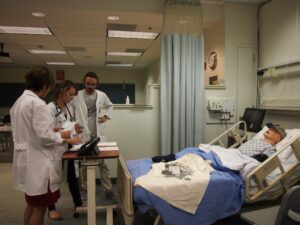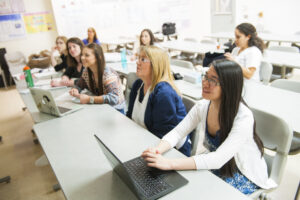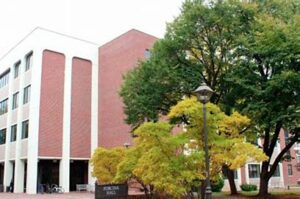Welcome to the TCNJ Department of Nursing Simulation Center
The Department of Nursing Simulation Center endeavors to follow the standards of best practice as established by the International Association of Clinical Simulation in Nursing (INACSL). Our lab hours for the summer are available by appointment only. Please contact our center staff at leboc@tcnj.edu for more information and/or to schedule a tour.
Simulation is a “strategy – not a technology – to mirror, anticipate, or amplify real situations with guided experiences in a fully interactive way.” Simulation allows students to participate in a variety of scenarios to help them practice in a life-like, hands-on situation. During simulation, many times a simulator is used and this simulator “replicates a task environment with sufficient realism to serve a desired purpose.” Definition obtained via http://www.ahrq.gov/
The simulation environment whether using a high fidelity mannequin or a standardized patient must be an environment of safety for the students and faculty alike where confidentiality is maintained.
Advantages include:
-
-
- Realistic client situations can be reproduced
- No threat to client safety and ethical concerns are minimized
- Active learning occurs
- Specific and unique client situations can be created
- Errors can be corrected and discussed immediately
- Consistent and comparable experience can occur for all students
- Maximal amount of learning time
- Experimentation and creativity are allowed
- Self-evaluation is promoted
- Feedback can be elicited
- Decision making can be promoted effectively
-
 Our mission is to provide the most realistic practical learning experiences in a safe environment that is based on nursing knowledge, patient safety, evidenced –based practice and professionalism. The simulation center uses innovative methods to enhance our students’ education to help develop the students’ professional practice.
Our mission is to provide the most realistic practical learning experiences in a safe environment that is based on nursing knowledge, patient safety, evidenced –based practice and professionalism. The simulation center uses innovative methods to enhance our students’ education to help develop the students’ professional practice.
To prepare professional (both undergraduate and graduate) nurses who:
- Provide Patient-Centered Care
- Work in Interdisciplinary Teams
- Understand and Provide Safe Care
- Employ Evidence-Based Practice
- Apply Quality Improvement
- Use Information Technology
- Emphasize Caring
- Are Enabled to Think Critically
- Can use Independent Judgment
- Showcase Autonomous Behaviors
- Have Enhanced Clinical and Ethical Decision-Making Skills
 Trenton Hall Lower Level houses two of the current three skill/simulation areas for the Department of Nursing.
Trenton Hall Lower Level houses two of the current three skill/simulation areas for the Department of Nursing.
The Trenton Hall lecture area is a smart classroom for 40 students. The rear of the room is set up to reflect either a clinic or emergency room with examination tables, examination lights and examination stools with curtains around each of the examination areas. Closets and cabinets house supplies.
 The Trenton Hall, The Gladys Word Nursing Simulation Laboratory, has the front of the room set up for primarily debriefing purposes although skills classes can be taught in this area as there is a smart classroom set-up. The back area of the room has hospital beds and various high fidelity mannequins, medium fidelity mannequins and task trainers. There is also a high fidelity artificial intelligence (AI) mannequin which responds back to the learners when questions are asked. There is compressed air available on one side of the room to simulate oxygen and medical air as well as suction. Closets and cabinets house supplies.
The Trenton Hall, The Gladys Word Nursing Simulation Laboratory, has the front of the room set up for primarily debriefing purposes although skills classes can be taught in this area as there is a smart classroom set-up. The back area of the room has hospital beds and various high fidelity mannequins, medium fidelity mannequins and task trainers. There is also a high fidelity artificial intelligence (AI) mannequin which responds back to the learners when questions are asked. There is compressed air available on one side of the room to simulate oxygen and medical air as well as suction. Closets and cabinets house supplies.
 The Forcina, Nursing Simulation Laboratory, has four beds and two examination rooms. There are sinks at all patient care areas. There is also one debriefing room with a camera and television to review recordings. This area has full AV equipment and all areas can have sessions recorded using our SimCapture technology. Telephones are included into the AV recordings. High fidelity mannequins as well as standardized patients can be used in this center. There are two examination rooms with outside entrances. Closets and cabinets house supplies. A code cart, isolation cart, medication administration system cart and maternity suite equipment is available at this site as well as in Trenton Hall. There is a control room for the AV equipment. An additional classroom area in Forcina can be used for nursing skills demonstration, extra debriefing area, fish-bowl style simulation and a staging area for simulation preparation.
The Forcina, Nursing Simulation Laboratory, has four beds and two examination rooms. There are sinks at all patient care areas. There is also one debriefing room with a camera and television to review recordings. This area has full AV equipment and all areas can have sessions recorded using our SimCapture technology. Telephones are included into the AV recordings. High fidelity mannequins as well as standardized patients can be used in this center. There are two examination rooms with outside entrances. Closets and cabinets house supplies. A code cart, isolation cart, medication administration system cart and maternity suite equipment is available at this site as well as in Trenton Hall. There is a control room for the AV equipment. An additional classroom area in Forcina can be used for nursing skills demonstration, extra debriefing area, fish-bowl style simulation and a staging area for simulation preparation.
Meet Our Simulation Staff
| Name | Title | Email Address | Phone Number | Room Number |
|---|---|---|---|---|
| Norma Brown, MSN, RN, CHSE | Coordinator, Simulation & Clinical Learning Resource Center | nbrown@tcnj.edu | 609-771-3459 | 14 |
| Chelsea Lebo, MSN, RN, MEDSURG-BC, CHSE | Simulation Facilitator | LeboC@tcnj.edu | 609-771-2502 | 14 |
| Chris Woods, CHSOS | Healthcare Simulation Operations Specialist | woodsc@tcnj.edu | 609-771-2751 | Forcina xxx/Trenton Hall xxx |
TCNJ Simulation Lab Facebook Page: https://www.facebook.com/groups/TCNJnursingsimlab
TCNJ Simulation Lab Instagram: https://www.instagram.com/tcnj_nursing_simulation_lab/
Society for Simulation in Healthcare: https://www.ssih.org
International Nursing Association for Clinical Simulation and Learning: https://www.inacsl.org
Association for Standardized Patient Educators: https://www.aspeducators.org
National League for Nursing: http://www.nln.org
American Nurses Association: https://www.nursingworld.org
 Standardized patient (SP) simulation involves the use of individuals trained to portray all characteristics of a real patient or family member to allow nursing students to practice various clinical skills. At The College of New Jersey we utilize SPs in both undergraduate and graduate simulations.
Standardized patient (SP) simulation involves the use of individuals trained to portray all characteristics of a real patient or family member to allow nursing students to practice various clinical skills. At The College of New Jersey we utilize SPs in both undergraduate and graduate simulations.
SPs give nursing students an opportunity to learn and to be evaluated on learned skills in a practice environment. During an interaction with a student the SP may present medical history in response to a question by the student, undergo a limited physical assessment by the student, assist students in developing communication and clinical skills, and assist students in working through challenging emotional situations in a safe setting.

